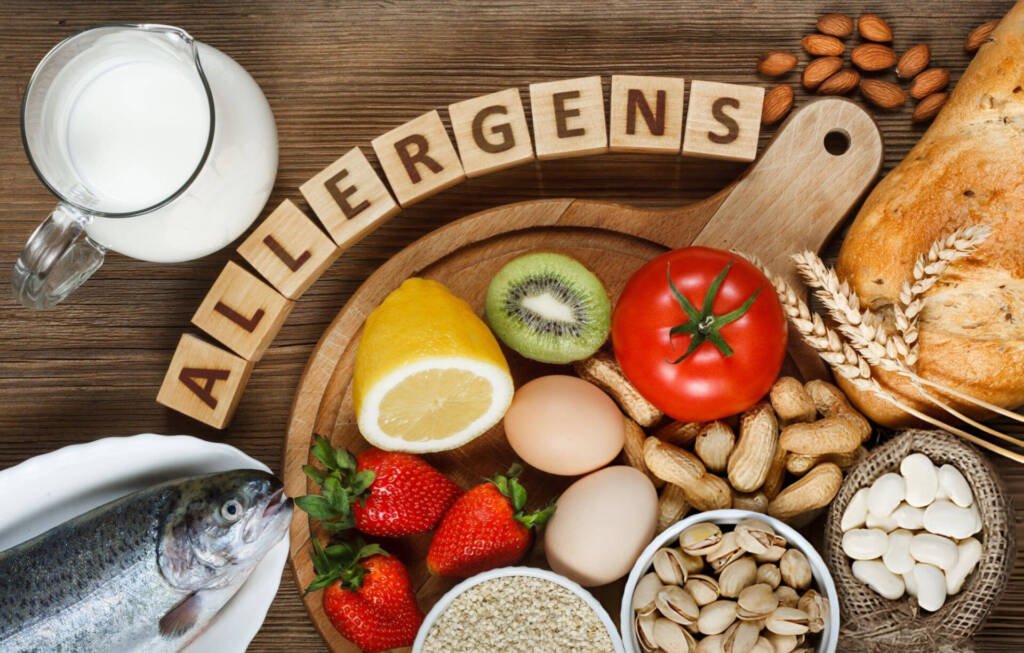There are 29 different food categories and thousands of individual products within each category. It’s a little surprising that many of us don’t react well to everything we eat. In fact, it’s estimated that about 32 million Americans have food allergies and even more have food intolerances.
Table of Contents
While most of the food you eat throughout your life will have no negative impact on you, you may occasionally experience a physical reaction.
When eating or being exposed to a particular food product causes a reaction, this indicates you’re experiencing one of two things: a food allergy or a food intolerance.
Unfortunately, most people can’t tell the difference at a glance.
Many people assume they’re allergic to a specific food when it causes them to throw up or have stomach pains, but the issue may be an intolerance.
Understanding the differences between food allergies and intolerances is crucial. This knowledge empowers you to make informed decisions about your diet and health.
What Are Food Allergies?

A food allergy is a serious condition, the most severe response your body can have to a specific food. Recognizing and managing allergies promptly is important to avoid potentially life-threatening reactions.
Food allergies can affect multiple parts of the body at once, causing swelling around the face, lips, throat, and tongue, vomiting, and hives. They can also be life-threatening, as they can often cause the throat to close up, making it difficult to breathe.
If you have a food allergy, you can’t simply cut down on the amount of food you eat. Instead, you need to avoid the product entirely and contact the emergency services immediately if you end up having a reaction. This is because untreated food allergies can lead to serious complications, such as anaphylaxis, which can be life-threatening.
What Is A Food Intolerance?

A food intolerance is a less severe but still negative response to a food. When you have an intolerance, your body struggles to produce the right enzymes required to process certain foods. This can lead to a range of side effects and symptoms, such as gastrointestinal pain, vomiting, and gas. Food intolerances can be caused by a variety of factors, including genetics. If you have a family history of food allergies or intolerances, you may be at a higher risk.
With a food intolerance, you can tolerate a minimal amount of a particular product before you begin to notice side effects. Sometimes, you can take treatments that help you process the foods you’re intolerant of.
For instance, if you’re lactose intolerant, there are pills that provide you with a version of the lactose enzyme your body is lacking.
While food intolerances are unpleasant, they’re not as dangerous as food allergies, and they’re less likely to be life-threatening. However, they can still significantly impact your quality of life, causing stress, anxiety, and social isolation.
Is It A Food Allergy Or A Food Intolerance?
Because the symptoms of food allergies and intolerances can overlap, it’s possible to get the two mixed up. The best way to determine how significant your response to a certain food is will be to speak to a doctor. Generally speaking, …
A food allergy:
- Is an immune system reaction wherein your body mistakenly treats proteins in food as a threat (like an infection or bacteria).
- Triggers severe symptoms, ranging from rashes and wheezing to itching, anaphylaxis, trouble breathing, and vomiting.
- Is often related to specific foods, such as fish, shellfish, eggs, milk, and peanuts.
- Can be life-threatening.
A food intolerance:
- Does not involve the immune system but instead has to do with an imbalance of certain digestive enzymes in the body.
- It can cause a range of symptoms. These symptoms often occur gradually over a few hours after eating the food.
- Many different kinds of foods can cause this and can be managed by reducing their intake. This means you can still enjoy these foods, but in smaller portions or less frequently, to avoid triggering symptoms.
- Will not be life-threatening.
How Do You Manage Intolerances and Allergies?

The strategy you use to manage an intolerance or allergy will depend on what kind of issue you have. If you have a mild allergy, your doctor will often recommend staying away from the food product and checking the ingredients in your meals carefully before consuming them. By managing your allergies or intolerances, you can significantly improve your quality of life and reduce the risk of serious health complications.
If your allergy is severe, your doctor may prescribe an epi-pen in case of anaphylaxis. You must also avoid eating or being exposed to the problem food at all costs.
If you have a food intolerance, you may be able to reduce your consumption of the food that causes problems. In some cases, you can also take synthesized versions of the enzymes required to process your problem food.
In either case, it’s best to seek a doctor’s advice to ensure you’re pursuing treatment correctly. Your doctor should be able to ensure you’re taking the right steps to protect yourself. They may also refer you to a dietician or nutritionist who can help you develop a safe and balanced diet that meets your nutritional needs while avoiding your problem foods.
Doctors can also conduct allergy tests, such as skin prick tests or blood tests, to determine whether there are any other problematic substances you need to avoid. These tests involve exposing your skin or blood to small amounts of potential allergens to see if a reaction occurs.






2 Comments
Thoughts+
I am intolerant to quite a lot of foods, I must get checked out. Great article
Suneil Gadal
I’m sorry to hear about your food intolerances. It’s definitely a good idea to get checked out. I’m glad you enjoyed the article! 😊